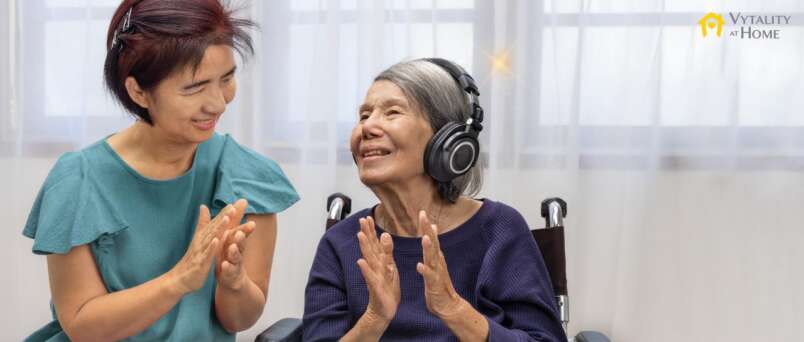Music and the mind: unlocking memories through favourite songs
Research studies constantly reveal how listening to and playing music is beneficial to our mental health. Many of us can relate to the soothing qualities of gentle music to help babies to sleep, or the energizing uplift of a power playlist for a long road trip in the car!
There has also been significant numbers of studies into the effect of music on dementia patients’ memory and cognitive function. These have resulted in a whole range of initiatives which put music at the heart of various initiatives, therapies and activities across Canada.
Why is music therapy so effective?
When we listen to music, several areas of our brain “light up” all at once, including the areas responsible for movement, emotion and memory. Music therapies can therefore potentially help improve cognitive and physical activity.
Studies have also shown that listening to music can help relieve pain. Even at a straightforward listening level, music therapy can help reduce agitation, stress and anxiety for all ages.
What’s the best music for stimulating memory?
Your musical memories are intertwined with your personal experiences and memories, from your favourite songs from your youth, the music you danced to at your wedding, songs you sang with your kids, and even TV theme tunes.
For those with dementia, these music-entwined memories are much more robust than others. According to Dr Bethany Cook, clinical psycologist:
“The best music to use are songs that the person with dementia used to listen to and love when they were ages 7ish to mid-20s … These foundational memories and songs are locked together in deeper vaults down windy mountain roads that dementia doesn’t seem to be able to fully crush. I’ve seen a person not recognize their spouse of 65 years but when I play their wedding song this individual turns to their spouse and they recognize them and dance.”
Music as your brain gym
A recent study by researchers at the University of Toronto and Unity Health Toronto supports the power of playing familiar music:
“We have new brain-based evidence that autobiographically salient music – that is, music that holds special meaning for a person, like the song they danced to at their wedding – stimulates neural connectivity in ways that help maintain higher levels of functioning.”
As the lead author of the study Michael Thaut, (a professor in both the Faculty of Music and Temerty Faculty of Medicine), commented:
“Keep listening to the music that you’ve loved all your life. Your all-time favourite songs, those pieces that are especially meaningful to you. Make that your brain gym.”
Music and the brain: the science
When we listen to new music, the auditory cortex of our brains are active. However, when we listed to music we know and love, we activate the network of the prefrontal cortex of the brain. The University of Toronto study cited above reported:
“Structural and functional changes (occurred) in neural pathways of study participants, notably in the prefrontal cortex, the brain’s control centre where deep cognitive processes occur … Autobiographically salient music activated a distinct neural network – a musical network – composed of diverse brain regions that showed differences in activation after a period of daily music listening.”
More specifically, researchers in Leipzig Germany found that:
“The ventral pre-supplementary motor area, which plays a role in planning and executing movements, and the caudal anterior cingulate, which helps us control our behavior, are the two brain areas most involved in encoding long-term musical memories. In Alzheimer’s patients, these regions of the brain are also among the last to atrophy or show signs of disrupted glucose-metabolism, two key markers of the disease.”
Not just favourite music
Other evidence seems to suggest that the music doesn’t necessarily have to be favourite music or from that somewhat narrow age range.
One research study followed people living with dementia through a 10-week music listening coaching group which included listening singing, vocal exercises and rhythmic movements. As the results showed, both those being cared for and their caregivers benefitted!
“Compared with usual care, both singing and music listening improved mood, orientation, and remote episodic memory and to a lesser extent, also attention and executive function and general cognition. Singing also enhanced short-term and working memory and caregiver well-being, whereas music listening had a positive effect on Quality of Life.”
The integration of music in this program may also have harnessed other benefits, as Professor Comeau from the University Of Ottowa suggests:
“By integrating movement with music, we harness cognitive, physical, and social benefits, ultimately contributing to improved mental health. The potential is too significant to overlook.”
Benefits of intergeneration singing
A special program in North Vancouver brings together seniors with dementia, their caregivers and high school students for music therapy. The brainchild of Windsor Secondary School Choral Music Director Adam Kozak, the intergenerational choir sing, chat and eat together.
According to Cindy Bouvet, VCH Psychogeriatric Mental Health Clinician:
“This choral singing in an intergenerational setting helps by slowing down the decline of the dementia process. There is less of a risk of depression in both caregiver and care receiver.”
And as Kozak told Global News, the students love it too.
“Even on a professional day, that they weren’t asked to come in, they still said ‘Are we still going to rehearse?’ They didn’t have school the whole day, and they still chose to come. It was pretty magical.”
A playlist in your pocket
Finally, we love the simplicity of the Music Project from the Alzheimers Society Canada. Anyone living with dementia in Ontario can request a personalized playlist preloaded onto an mp3 player. The scheme was implemented to “Reconnect people with the soundtrack of their lives”. Learn more at the Music Project.
We think that’s an idea that families could create for their loved ones, either on an mp3 player, a smart phone or as a playlist on a voice-activated smart speaker. Our caregivers will love it too perhaps as the soundtrack to some light housekeeping and cleaning – who doesn’t like to boogie in the bathroom or sing along from the sink!
Want to know more about music and the mind?
Check out our previous article on The Mozart Effect and how listening to Mozart and other classical music could benefit those with dyslexia, autism, depression and other mental health issues.
Looking for home care for your loved one?
Talk to us. We match our friendly, professional caregivers with your requirements, whether just a pop-in visit for a few hours one day a week, right up to 24 hour care if required.




